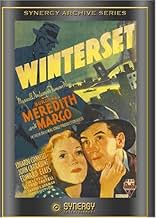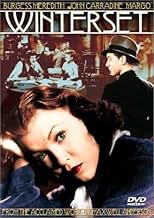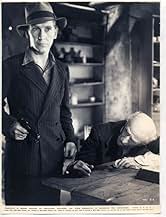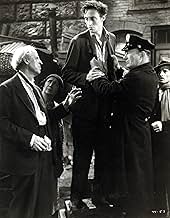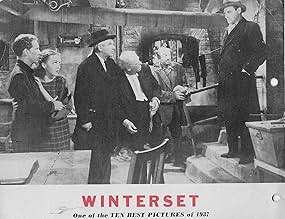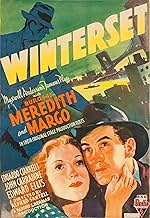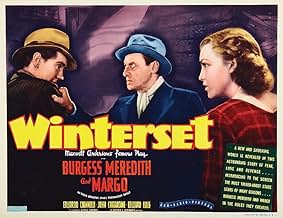Füge eine Handlung in deiner Sprache hinzuImmigrant radical Bartolomeo Romagna is falsely condemned and executed for a payroll robbery. Years later, his son Mio sets out to find the truth of the crime and to bring to account the gan... Alles lesenImmigrant radical Bartolomeo Romagna is falsely condemned and executed for a payroll robbery. Years later, his son Mio sets out to find the truth of the crime and to bring to account the gangster Trock Estrella.Immigrant radical Bartolomeo Romagna is falsely condemned and executed for a payroll robbery. Years later, his son Mio sets out to find the truth of the crime and to bring to account the gangster Trock Estrella.
- Regie
- Drehbuch
- Hauptbesetzung
- Für 2 Oscars nominiert
- 4 Gewinne & 4 Nominierungen insgesamt
Murray Alper
- Louie
- (Nicht genannt)
Empfohlene Bewertungen
Maxwell Anderson's Pulitzer Prize winning Broadway play was brought to the screen by RKO in 1936 with the original cast members, and Anderson himself adapting the Screen-Play.........The results were a hard-hitting expose' of injustice in the Judicial system of the 1920s........Based loosely on the Sacco-Vancetti trial of the 1920s, Anderson wrote a powerful adaptation of his Stage hit...........Burgess Meredith, along with Eduardo Ciannelli reprised their Stage roles as Mio, and Troc Estrella respectively in their first screen appearences......Both would go on to do scores of films and stage work for decades to come after Critic's raved about their work in "Winterset"......Set under the Brooklyn Bridge for most of the film, the characters involved in the injustice, assemble seeking the truth & to avoid it becoming public knowledge.........Ciannelli's "Troc Estrella" is one of the screens most dastardly bad guys of all time......and Stanley Ridges is a standout as "Shadow' his henchman...............The Musical score by Nathaniel Shilkret & Max Steiner(un-credited) was nominated for an Oscar.......It was so compelling in this Dark-Drama, that Orson Welles used portions of it in his film "Journey Into Fear'-1942....also released by RKO.......If you are a fan of fine Dramatic Acting, superb musical scoring, and very early film noir(1936)....you should see "Winterset.......Tense, Poetic, and spell-binding....It is available on Video and DVD at Amazon.com, for a very low price.......Respectively submitted, sasheegm at the movies
The chance to see Broadway players recreate their performances on film back in the day should never be missed. Burgess Meredith, Margo, and Eduardo Ciannelli recreate their stage roles from Winterset in this 1936 film. But the story itself is horribly dated, mostly with a lot of left wing rhetoric which gets in the way of the plot.
Probably back in 1936 no one cared as the cause of Sacco&Vanzetti was still fresh in everyone's mind. Today it is still debated by historians and legal scholars and the two working class Italian-Americans are still venerated in Italian-American households of a more liberal persuasion in their politics. But the average American today knows the case vaguely if at all today.
The men went to the electric chair in Massachusetts protesting their innocence as does John Carradine in this film. Before Carradine dies he imparts a sense of mission to his son who grows up to be Burgess Meredith to find the real guilty parties.
A review of the case by a law school class saying that the state electrocuted the wrong man brings new attention to the case, not something that Eduardo Ciannelli likes. He was the real trigger man in the case and now he's a big shot gangster.
Rather improbable events bring Meredith, Ciannelli, the judge Edward Ellis now a drunken derelict, Paul Guilfoyle another accomplice, Guilfoyle's father Maurice Moscovitch and his sister Margo all together on a rainy and stormy night.
Maxwell Anderson wrote the original play and I have to contrast it with another of his plays that made it to the screen, Key Largo. It was another film where various folks are trapped in a storm and interesting things happen. Winterset never really sheds its stage origins and can't shake the rhetoric. Contrast that to Key Largo which never loses your interest for a second and while most of the action takes place in a closed down out of season hotel where the cast is holed up you never get any sense of staginess in it. The rhetoric is there, but it never gets in the way of the story as in Winterset.
Even with Oscar nominations for Art Direction and Musical scoring Winterset is a relic of bygone days.
Probably back in 1936 no one cared as the cause of Sacco&Vanzetti was still fresh in everyone's mind. Today it is still debated by historians and legal scholars and the two working class Italian-Americans are still venerated in Italian-American households of a more liberal persuasion in their politics. But the average American today knows the case vaguely if at all today.
The men went to the electric chair in Massachusetts protesting their innocence as does John Carradine in this film. Before Carradine dies he imparts a sense of mission to his son who grows up to be Burgess Meredith to find the real guilty parties.
A review of the case by a law school class saying that the state electrocuted the wrong man brings new attention to the case, not something that Eduardo Ciannelli likes. He was the real trigger man in the case and now he's a big shot gangster.
Rather improbable events bring Meredith, Ciannelli, the judge Edward Ellis now a drunken derelict, Paul Guilfoyle another accomplice, Guilfoyle's father Maurice Moscovitch and his sister Margo all together on a rainy and stormy night.
Maxwell Anderson wrote the original play and I have to contrast it with another of his plays that made it to the screen, Key Largo. It was another film where various folks are trapped in a storm and interesting things happen. Winterset never really sheds its stage origins and can't shake the rhetoric. Contrast that to Key Largo which never loses your interest for a second and while most of the action takes place in a closed down out of season hotel where the cast is holed up you never get any sense of staginess in it. The rhetoric is there, but it never gets in the way of the story as in Winterset.
Even with Oscar nominations for Art Direction and Musical scoring Winterset is a relic of bygone days.
I thought Burgess Meredith turned in quite a characterful performance in this otherwise rather dry drama. He is "Mio" whose late father we have already seen at the top of the film being condemned to the chair for his part in a robbery. Now, a generation later he is determined to prove that he was innocent. What quickly becomes apparent is that the investigation at the time was largely based around the "if your face fits" theory, and it doesn't take "Mio" very long to get onto the trail of a far more likely culprit. Meantime, we also discover that a speech made by his dad upon sentencing declaring his innocence and warning the judge that his will be a sort of living death from now on has turned out to be eerily true. That judge (Edward Ellis) has indeed somewhat lost the plot, and is a ghost of his former self wandering the streets with little memory of who he is or was. It might well be that "Mio" could be in a position to salvage more than one should here? The plot clearly seeks to highlight the difficulties for the poverty stricken, slum-dwelling, population of the USA to not just get by in life, but to get a fair hearing from authority. That's not just the court proceedings, but also far more rudimentary aspects of freedom. Even an assembly to dance attracts the police. Ultimately, though, it really does come down to a straightforward style of good and evil, and with the underplayed but effectively sinister effort from Eduardo Ciannelli and a really quite impactful one from Ellis, this can at times be quite a poignant evaluation. Alfred Santelli hasn't done so much to creatively adapt it from the stage though, and that straight transfer to celluloid sees it lose quite a bit of it's intensity. Even with the romantic attachment to "Miriamne" (Margo), much of the intimacy is gone, the dialogue is all too often delivered as if it were set-piece monologues, and none of the characters really come together until very near the end. Just taking it from the theatre to the cinema was always going to compromise some of the nuance, and though this is still a decent effort it just misses a little of the story's soul.
I like this film. It is an interesting retelling of a point of view regarding one of America's most controversial trials - the 1921 - 1927 legal ordeal of Nicolo Sacco and Bartholomeo Vanzetti for the murder of two men in a payroll robbery in Massachusetts. Both were Italian anarchist immigrants in the U.S. Both were convicted by juries which were local Yankee in make-up, not having any non-Yankees on them. Certainly no Italian Americans. The judge, Webster Thayer, was an openly bigoted man. But thousands of people around the country and the world attacked the verdict, and demanded a retrial. Among those who attacked the trial was George Bernard Shaw, Edna St. Vincent Millay, Sinclair Lewis, Fiorello La Guardia, and (in a move that opened his later great judicial career) Felix Frankfurter. After going through appeals, and the revelations of a fellow prisoner that the payroll robbery was committed by a local criminal gang, the matter was left to a small commission headed by President Lowell of Harvard College. It turned out to be a whitewash. In the end, the two men were electrocuted. Thayer's and Lowell's reputations never recovered from this.
Scholars on the case are still divided on the guilt or innocence of the two defendants - some have suggested they were both railroaded, or that Sacco was more likely to be guilty, but Vanzetti was probably innocent. Today, nearly eighty years after their deaths they still remain a flash point regarding American bigotry. In 1977, on the 50th Anniversary of their deaths, Governor Michael Dukakis formally pardoned both men.
Maxwell Anderson wrote about the subject twice: the play WINTERSET and the play HIGH TOR. Anderson's reputation as a dramatist has been inflated over the years by critics like Brooks Atkinson. He could occasionally write a well done play, but he was not on the level of his contemporary Eugene O'Neill. O'Neill's tragedies (especially his final ones) was based on personal demons from his family and his life. O'Neill was also willing to experiment on stage with masks (THE GREAT GOD BROWN) or with internal counter-dialogs (STRANGE INTERLUDE) or even with trilogies based on Greek originals (MOURNING BECOMES ELECTRA). Anderson only experimented one way - he tried blank verse plays (ELIZABETH THE QUEEN, MARY OF Scotland), and did not do it too well. But here he obviously was passionately determined to defend the memory of the two Italian - American anarchists. His plot is based on developing the thread of the confession (mentioned above) that the murders were planned by a local criminal gang. The gang's leader is Eduardo Cianelli, a brutal criminal who framed the two men by stealing their car as the getaway car.
But the strength of the confession is furthered by claiming the judge was bribed (Thayer was biased but not bribed). Edward Ellis (best recalled as the missing inventor in THE THIN MAN) is the corrupt jurist, who is now a wandering derelict. Vanzetti's famous final letter from the death cell (an elegant final comment that is the basis of contention between Henry Fonda and Eugene Palette in THE MALE ANIMAL) is the basis for the elegant denunciation of the judge in the court by John Carridine (note that his character's first name is also Bartholomeo). Ironically, today, it is believed that elegant final message of Vanzetti may have been written in part by a reporter who supported the defendants.
The son and daughter of the dead men (Burgess Meredith and Margo) are seeking to prove their innocence. But they run against the determination of Cianelli, and his goons. The film is fascinating enough, and concludes satisfactorily (much more than the actual case did). The plot's conclusion also leads to a more prosaic point - if you plan to use a signal to destroy someone, don't forget that signal and use it yourself. See the film to understand that last point.
Scholars on the case are still divided on the guilt or innocence of the two defendants - some have suggested they were both railroaded, or that Sacco was more likely to be guilty, but Vanzetti was probably innocent. Today, nearly eighty years after their deaths they still remain a flash point regarding American bigotry. In 1977, on the 50th Anniversary of their deaths, Governor Michael Dukakis formally pardoned both men.
Maxwell Anderson wrote about the subject twice: the play WINTERSET and the play HIGH TOR. Anderson's reputation as a dramatist has been inflated over the years by critics like Brooks Atkinson. He could occasionally write a well done play, but he was not on the level of his contemporary Eugene O'Neill. O'Neill's tragedies (especially his final ones) was based on personal demons from his family and his life. O'Neill was also willing to experiment on stage with masks (THE GREAT GOD BROWN) or with internal counter-dialogs (STRANGE INTERLUDE) or even with trilogies based on Greek originals (MOURNING BECOMES ELECTRA). Anderson only experimented one way - he tried blank verse plays (ELIZABETH THE QUEEN, MARY OF Scotland), and did not do it too well. But here he obviously was passionately determined to defend the memory of the two Italian - American anarchists. His plot is based on developing the thread of the confession (mentioned above) that the murders were planned by a local criminal gang. The gang's leader is Eduardo Cianelli, a brutal criminal who framed the two men by stealing their car as the getaway car.
But the strength of the confession is furthered by claiming the judge was bribed (Thayer was biased but not bribed). Edward Ellis (best recalled as the missing inventor in THE THIN MAN) is the corrupt jurist, who is now a wandering derelict. Vanzetti's famous final letter from the death cell (an elegant final comment that is the basis of contention between Henry Fonda and Eugene Palette in THE MALE ANIMAL) is the basis for the elegant denunciation of the judge in the court by John Carridine (note that his character's first name is also Bartholomeo). Ironically, today, it is believed that elegant final message of Vanzetti may have been written in part by a reporter who supported the defendants.
The son and daughter of the dead men (Burgess Meredith and Margo) are seeking to prove their innocence. But they run against the determination of Cianelli, and his goons. The film is fascinating enough, and concludes satisfactorily (much more than the actual case did). The plot's conclusion also leads to a more prosaic point - if you plan to use a signal to destroy someone, don't forget that signal and use it yourself. See the film to understand that last point.
Winterset starts out beautifully and profoundly. The story flows well, but the latter scenes are so implausibly constrained that I ended up losing sympathy for the characters. The dialog was hard to make sense of at times, and many of the movie's sequences look like dark scenes from a bad dream... you know, the kind of situation you just can't escape from.
It looks as though, in the transition to turning the stage play into a movie, the makers never gave much thought to overcoming the obvious limitations that the stage imposes on what we now think of as the "action sequences".
I don't regret the time spent watching Winterset. It was interesting, but as a movie (and even allowing for its vintage) it was just "OK".
It looks as though, in the transition to turning the stage play into a movie, the makers never gave much thought to overcoming the obvious limitations that the stage imposes on what we now think of as the "action sequences".
I don't regret the time spent watching Winterset. It was interesting, but as a movie (and even allowing for its vintage) it was just "OK".
Wusstest du schon
- WissenswertesBurgess Meredith, in his first film with a credited role, recreates the role he played in the original Broadway production.
- VerbindungenFeatured in Sprockets: Masters of Menace (1995)
Top-Auswahl
Melde dich zum Bewerten an und greife auf die Watchlist für personalisierte Empfehlungen zu.
- How long is Winterset?Powered by Alexa
Details
- Erscheinungsdatum
- Herkunftsland
- Sprachen
- Auch bekannt als
- Under New Yorks broar
- Drehorte
- Produktionsfirma
- Weitere beteiligte Unternehmen bei IMDbPro anzeigen
- Laufzeit
- 1 Std. 17 Min.(77 min)
- Farbe
- Seitenverhältnis
- 1.37 : 1
Zu dieser Seite beitragen
Bearbeitung vorschlagen oder fehlenden Inhalt hinzufügen

